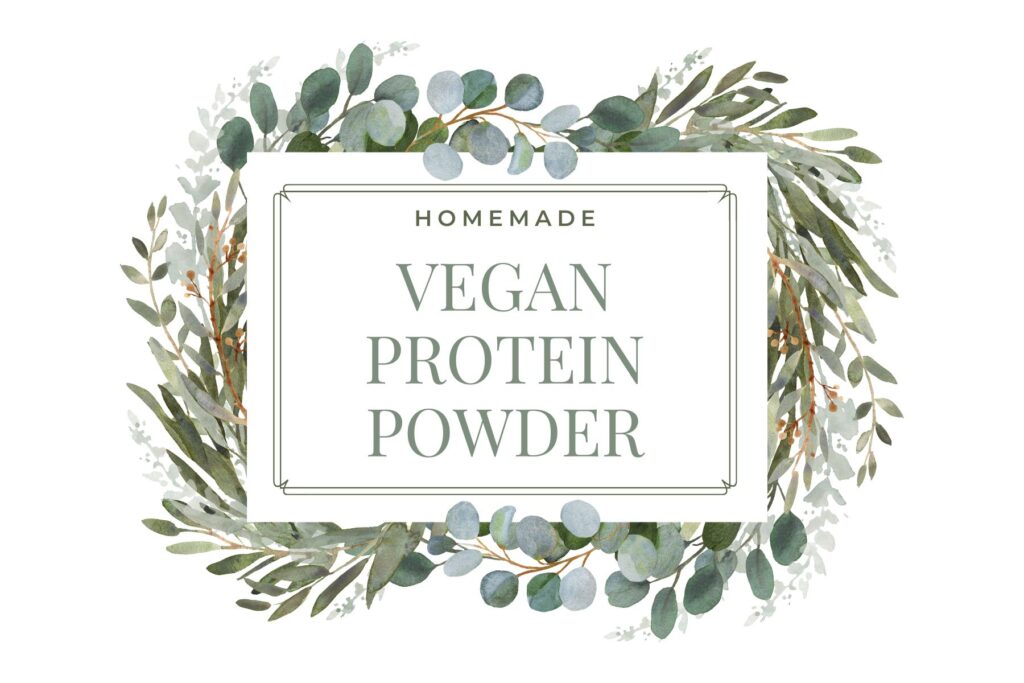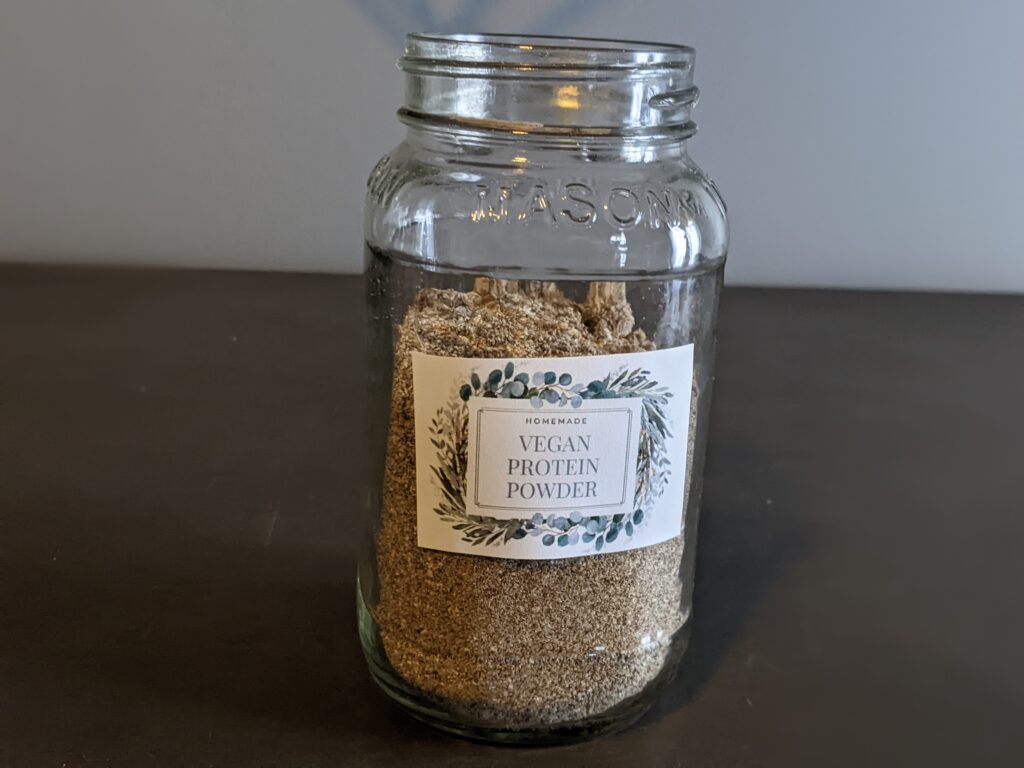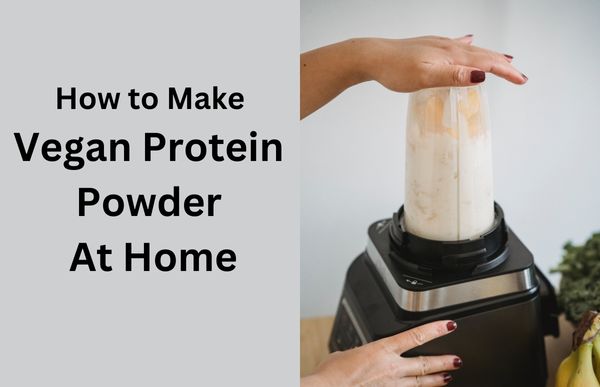When I learned from my last lab work that my cholesterol and triglycerides were high, I shifted to more of a plant-based lifestyle and getting enough protein became my constant concern.
Full disclosure: I am not yet eating completely plant-based as of yet; sometimes I may have salmon or chicken with my meal.
There are lots of vegan protein options but I found them to be a little expensive for my budget. So, I thought why not make it myself. Making your own protein powder is not only cheaper, but it also allows you to have control over the ingredients and customize it to your own taste and nutritional needs. In this blog post, I’ll show you how to make your own vegan protein powder and share some ways to incorporate it into your daily diet.
You’ll need a powerful blender or food processer that can grind seeds into powder, or a coffee grinder. (I was disappointed to learn that my expensive blender couldn’t grind seeds unless it had an additional attachment. Fortunately, I still had my MagicBullet, which worked quite well to grind up everything.)
Recipe for Vegan Protein Powder
Ingredients:
1 cup of dried oats:
1 cup of hemp seeds:
1/2 cup of chia seeds:
1/2 cup of flax seeds:
1/2 cup of pumpkin seeds:
Instructions:
- In a food processor or blender, grind the oats until they form a fine powder.
- Add in the hemp seeds, chia seeds, flax seeds, and pumpkin seeds and blend until well combined.
- Store the mixture in an airtight container in a cool, dry place.
You can also blend them separately, as I did, and then blend them together in a bowl once everything is in powder form. Your powder may be a little clumpy, just use your hands to break up the clumps before putting in your air-tight storage container.
Benefits of each ingredient in this recipe:
Oats: Oats are a great source of dietary fiber and protein. They also contain essential minerals such as iron, magnesium, and zinc. Oats can help reduce cholesterol levels, lower blood pressure, and improve digestive health.
Hemp seeds: Hemp seeds are a complete source of protein, meaning they contain all the essential amino acids our body needs. They’re also rich in healthy fats and minerals like magnesium, zinc, and iron. Hemp seeds can help improve heart health, reduce inflammation, and support the immune system.
Chia seeds: Chia seeds are a great source of protein, fiber, and healthy fats. They also contain essential minerals like calcium, iron, and magnesium. Chia seeds can help regulate blood sugar levels, reduce inflammation, and improve digestive health.
Flax seeds: Flax seeds are a great source of protein and fiber. They’re also rich in healthy fats, specifically omega-3 fatty acids, and minerals like magnesium and iron. Flax seeds can help reduce the risk of heart disease, lower cholesterol levels, and improve digestive health.
Pumpkin seeds: Pumpkin seeds are a great source of protein, fiber, and healthy fats. They’re also rich in minerals like magnesium, zinc, and iron. Pumpkin seeds can help improve heart health, reduce inflammation, and support the immune system.

Here’s the breakdown of protein in each ingredient used in this recipe.
The amount of protein in the vegan protein powder recipe will depend on the exact amounts used for each ingredient. However, based on the ingredients and their typical protein content, this recipe should provide approximately 20-25 grams of protein per 1/4 cup serving.
Assuming a 1/4 cup serving size (four tablespoons), the protein content in the recipe can be calculated as follows:
- Dried oats: 1 cup (around 100g) of oats contains about 16g of protein. 1/4 cup of oats would therefore provide approximately 4g of protein.
- Hemp seeds: 1 cup (around 155g) of hemp seeds contains about 33g of protein. 1/4 cup of hemp seeds would therefore provide approximately 8g of protein.
- Chia seeds: 1 cup (around 150g) of chia seeds contains about 17g of protein. 1/4 cup of chia seeds would therefore provide approximately 4g of protein.
- Flax seeds: 1 cup (around 150g) of flax seeds contains about 18g of protein. 1/4 cup of flax seeds would therefore provide approximately 4g of protein.
- Pumpkin seeds: 1 cup (around 130g) of pumpkin seeds contains about 35g of protein. 1/4 cup of pumpkin seeds would therefore provide approximately 9g of protein.
So, the total protein content of a 1/4 cup serving of this vegan protein powder recipe would be around 29g. This would mean that the protein content per day would depend on how much of the powder is consumed each day, but 1/4 cup would provide about 20-25% of the daily recommended intake of protein for an average adult.

Here are some ways to incorporate your homemade vegan protein powder into your daily diet:
- Smoothies: Add a scoop of your homemade protein powder to your morning smoothie for a nutrient-packed breakfast.
- Oatmeal: Mix a scoop of the protein powder into your morning oatmeal for a protein boost.
- Baked goods: Add the protein powder to your favorite baked goods, such as muffins or cookies, for a healthier treat.
- Energy balls: Mix the protein powder with nut butter and dates to create energy balls for a healthy snack.
- Pancakes or waffles: Add the protein powder to your pancake or waffle batter for a protein-packed breakfast.
Final Thought
Making your own vegan protein powder is an easy and affordable way to ensure you’re getting the required protein with your plant-based lifestyle. If you try this recipe, please let me know the different ways that you decide to use it.
Resources
https://www.ncbi.nlm.nih.gov/pmc/articles/PMC5885279/
https://www.ncbi.nlm.nih.gov/pmc/articles/PMC6994964/
https://www.ncbi.nlm.nih.gov/pmc/articles/PMC6567199/

